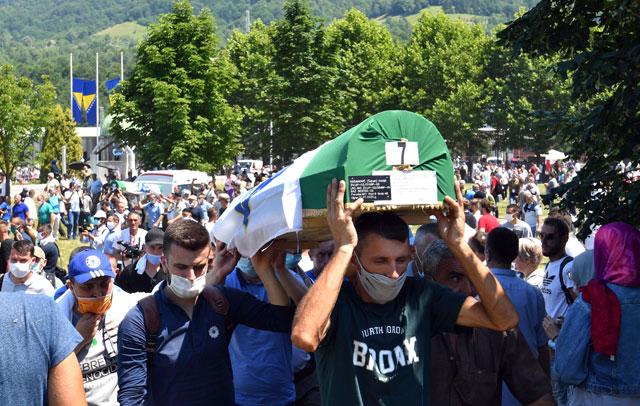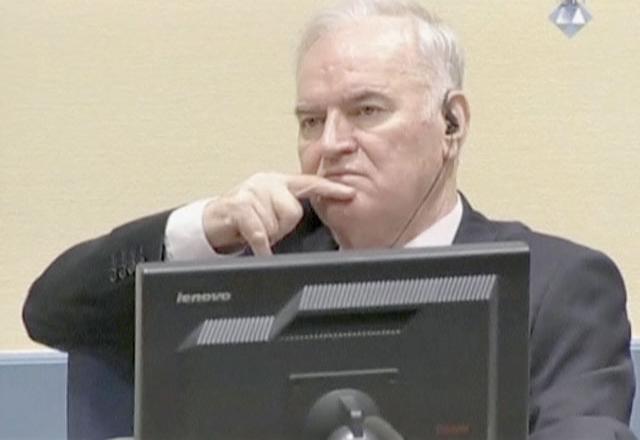You are here
Ex Bosnian Serb leader Karadzic guilty of Bosnia genocide, jailed for 40 years
By Reuters - Mar 24,2016 - Last updated at Mar 24,2016
THE HAGUE — Former Bosnian Serb leader Radovan Karadzic was convicted by UN judges of genocide for the 1995 Srebrenica massacre, the worst war crime in Europe since World War II, and sentenced to 40 years in prison.
Karadzic, 70, the former president of the breakaway Bosnian Serb Republic, was found guilty on 10 out of 11 charges brought by war crimes prosecutors at the International Criminal Tribunal for the Former Yugoslavia in The Hague. He would appeal the decision, his legal adviser said.
"The accused was the sole person within Republika Srpska [the Bosnian Serb Republic] with the power to prevent the killing of the Bosnian Muslim males," said presiding judge O-Gon Kwok, in a reference to the 8,000 killed at Srebrenica.
"Far from preventing it, he ordered they be transferred elsewhere to be killed," the judge said.
Karadzic was acquitted of one count of genocide in various towns across Bosnia during the war of the 1990s.
The three-judge panel said Karadzic was "at the apex of power", heading the self-styled Bosnian Serb Republic and Supreme Commander of its armed forces, when crimes were committed by his troops.
Judges said the 44-month siege of Sarajevo could not have happened without his support; that he committed crimes against humanity in an attempt to purge Muslims and Croats from parts of Bosnia; and that he had intended to eliminate the Bosnian Muslim males of the town of Srebrenica.
Karadzic's legal adviser Peter Robinson said Karadzic was "disappointed by the verdict, astonished by the reasoning and he wants to appeal".
As the judges described the siege of Sarajevo, Karadzic looked pained and his face tightened into a grimace.
Victims' tears
Victims' families in the courtroom, some of then elderly, listened intently when the genocide at Srebrenica was discussed. One wiped away tears as the judge described men and boys being separated from their families.
When Karadzic was ordered to stand for sentencing, he listened with eyes mostly downcast. After judges departed, he sat back heavily in his chair.
Victims' families embraced before quietly leaving the courtroom.
Outside, Hatidza Mehmedovic, who lost her entire family at Srebrenica, said she was enraged by the verdict, and no punishment could have been harsh enough.
"He can live in a cushy prison while I have to live in Srebrenica, where his ideology is still in place," she said.
"I have no sisters, no brothers, no husband."
Karadzic was arrested in 2008 after 11 years on the run, following a war in which 100,000 people were killed as rival armies carved Bosnia up along ethnic lines that largely survive today.
Serbian Prime Minister Aleksandar Vucic said he would stand by the Serbs of Bosnia.
"We will stand by our people and we will protect their existence and their right to have their own state," he said.
Serge Brammertz, the court's chief prosecutor, said he hoped the ruling would make populist politicians in the region more reluctant to hail convicted war criminals as heroes.
"There is nothing heroic about raping persons, about sexual abuse in camps," he said. "There is nothing heroic about executing 7,000 prisoners which have been detained in impossible circumstances. There is nothing heroic to kill with snipers children who are playing."
He said prosecutors may appeal Karadzic's acquittal on the second genocide charge.
The only more senior official to face justice before the Tribunal was the late Serbian President Slobodan Milosevic, who died in custody a decade ago before a verdict was reached.
Ratko Mladic, the general who commanded Bosnian Serb forces, was the last suspect to be detained over the Srebrenica slaughter and is also in a UN cell awaiting judgment.
The Srebrenica massacre and the Serb siege of Sarajevo were events that turned world opinion against the Serbs and prompted NATO air strikes that helped bring the war to an end.
Karadzic defended himself through his 497-day trial and called 248 witnesses, poring over many of the millions of pages of evidence with the help of a court-appointed legal adviser.
Rejecting the charges against him, Karadzic sought to portray himself as the Serbs' champion, blaming some of the sieges and shelling on Bosnian Muslims themselves. He says soldiers and civilians who committed crimes during the war acted individually.
Opponents of the ICTY say its prosecutors have disproportionately targeted Serbs as 94 of 161 suspects charged were from the Serbian side, while 29 were Croat and nine Bosnian Muslim.
Prosecutors have been criticised for not bringing charges against two other leaders of that era who have since died — Croatian President Franjo Tudjman and Bosnian President Alija Izetbegovic.
Many Serbs, both in Bosnia and Serbia, regard the court as a pro-Western instrument, say Karadzic is innocent and believe his conviction is an injustice for all Serbs.
Related Articles
SREBRENICA, Bosnia and Herzegovina — Bosnian Muslims marked the 25th anniversary of the Srebrenica massacre on Saturday, the worst atrocity
THE HAGUE — UN judges on Wednesday sentenced former Bosnian Serbian commander Ratko Mladic to life imprisonment after finding him guilty of
POTOCARI, Bosnia and Herzegovina — Serbia's prime minister was forced to flee a ceremony held to mark 20 years since the Srebrenica massacre



















